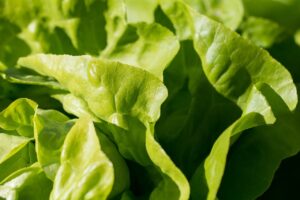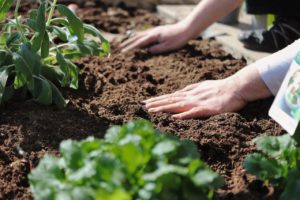”Seed is not just the source of life. It is the very foundation of our being.”
~Vandana Shiva
This month, I’ve been receiving notifications that the 2023 seed catalogues are ready. These announcements remind me of an early childhood memory: sitting at my grandmother’s kitchen table and watching her open small homemade sacs of fabric to reveal various seeds. The careful way she did this signalled that these bundles contained precious contents. These seeds were precious, indeed, because they had grown well in her garden conditions and for years, she had been selecting them from her best plants –- the best-tasting tomatoes and the most productive beans.
Forty years later, I’m in a lecture hall in Toronto listening to Vandana Shiva speak about farmers in India who have learned to sow and save the seeds appropriate for their growing conditions: seeds that grow into tall plants that hold their seedheads above water in parts of the country that are affected by monsoon rains, and seeds that grow into plants that tolerate the cooler, drier conditions of higher elevations in other regions. She is passionate about maintaining seed diversity and the rights of farmers to save their precious seeds. I think that my grandmother and Vandana Shiva would have enjoyed each other’s company!
There are two main categories of seeds available to the home gardener:
Open-pollinated seeds come from flowers pollinated by insects, wind or birds, and will “come true” — plants from these seeds will be similar or the same as the parent plants from which the seeds were saved. Heritage/Heirloom seeds are open-pollinated AND have been grown for at least one generation (some define this as 50 years) because of something special such as colour, flavour, size, hardiness, productivity or even an interesting story. They have passed the test of time. My grandmother’s saved seeds could belong to this category, as would the seeds promoted by Vandana Shiva.
Hybrid seeds come from a plant that is a cross between two varieties or species and most will not come true. Hybrid seeds labelled “F1” come from a highly controlled cross pollination. One might choose to grow these F1 seeds because of certain traits such as resistance to a specific plant disease. Hybrids can occur in nature too, especially with some plants that are pollinated by insects. A “Golden Zucchini” I grew in 2021 was golden yellow with green streaks — likely because the seeds were produced in a flower that had been visited by an insect travelling between different varieties of zucchini plants!
The non-profit Seeds of Diversity Canada aims to preserve a wide range of genetics in our seed supply. Members are taught how to save seeds from their own gardens and encouraged to share them with other gardeners at local “Seedy Saturday” events. Having access to the great diversity of open-pollinated heirloom seeds is a good strategy as we face unpredictable weather in a changing climate.
Wendy spent a good part of her adult life moving with her husband, never staying long enough to see an apple tree mature and bear fruit. When they retired, developing a food garden and planting hardy ornamentals became a passion. Weaving her previous studies in nutrition with her current interest in gardening has become a stimulating and life-giving activity.





Wow, Wendy, your grandmother would be very proud of you! I have always found your saving Heritage/Heirloom seeds quite fascinating; I really appreciated the explanation and clarity of this task in your article. Thanks.
Reading your reflection is like sitting with you, and your Grandmother, and Vandana Shiva, as you each share your seeds, with such respect/care for these tiny bearers of life. Thank you
Reading your article it reminds me the variety of seeds (tropical regions) that my mom too use to collects and get ready and she would explains to us that different seeds grows/planted according to the monsoon.
Beautiful reflections…
Thanks!